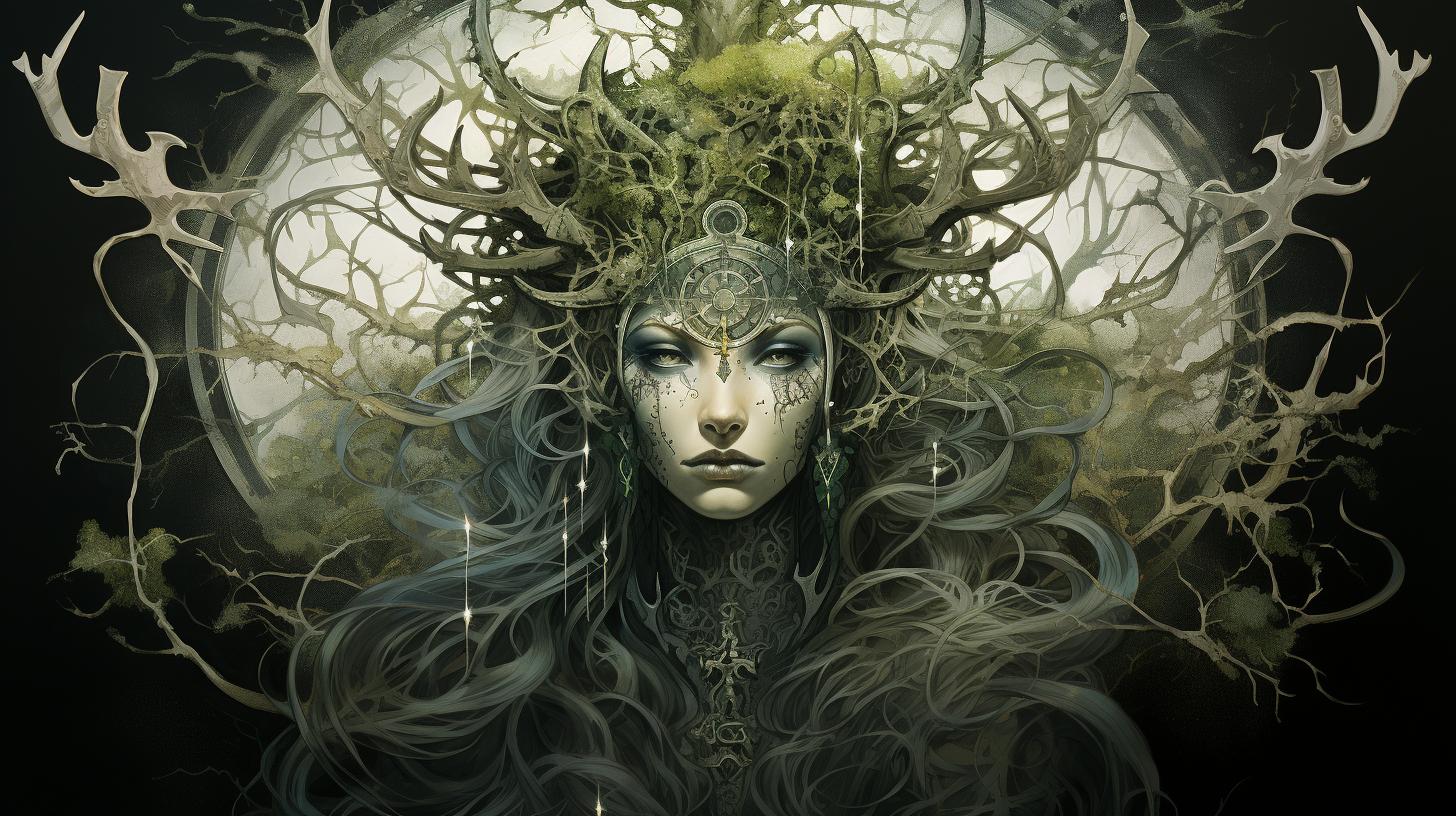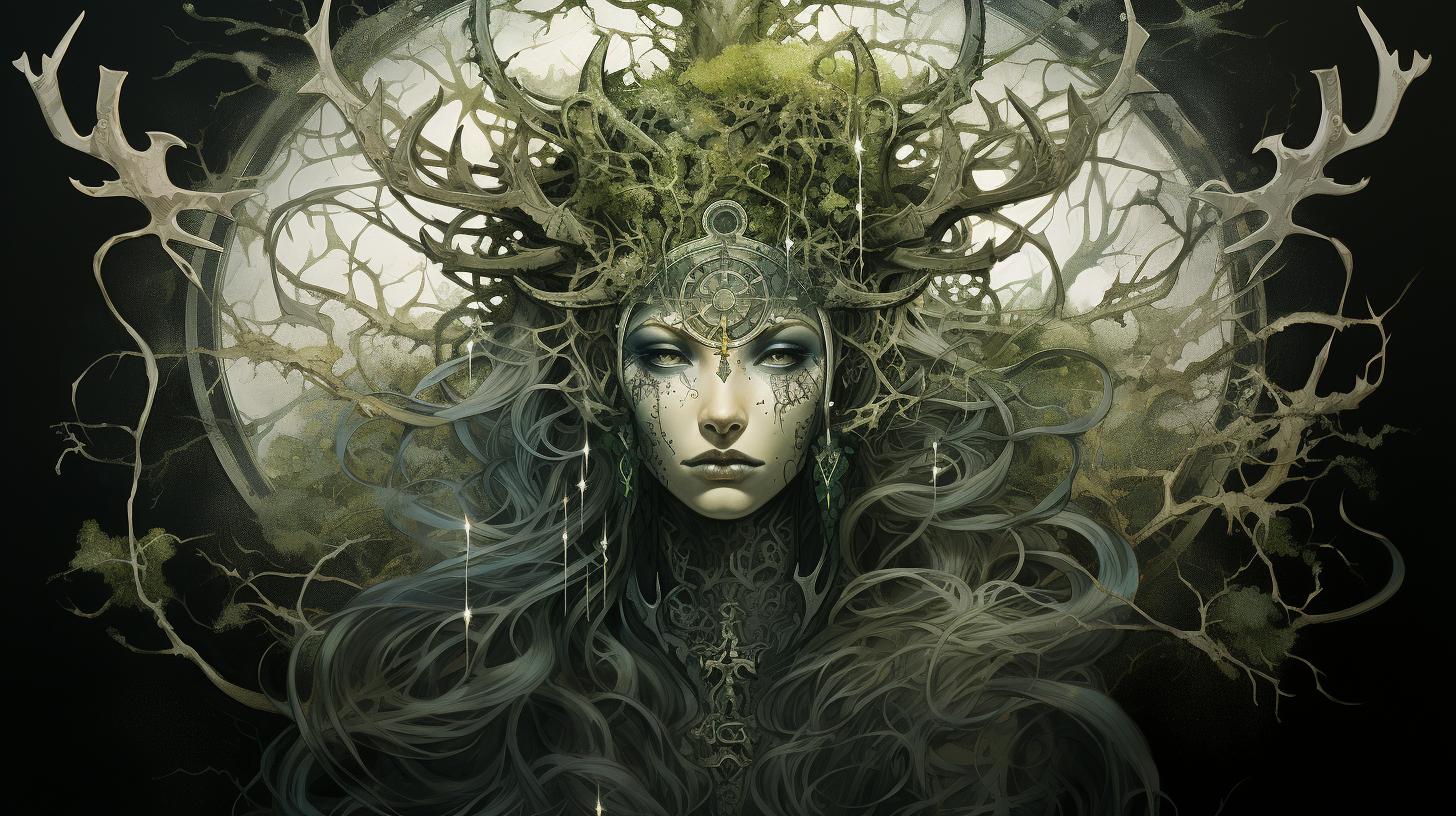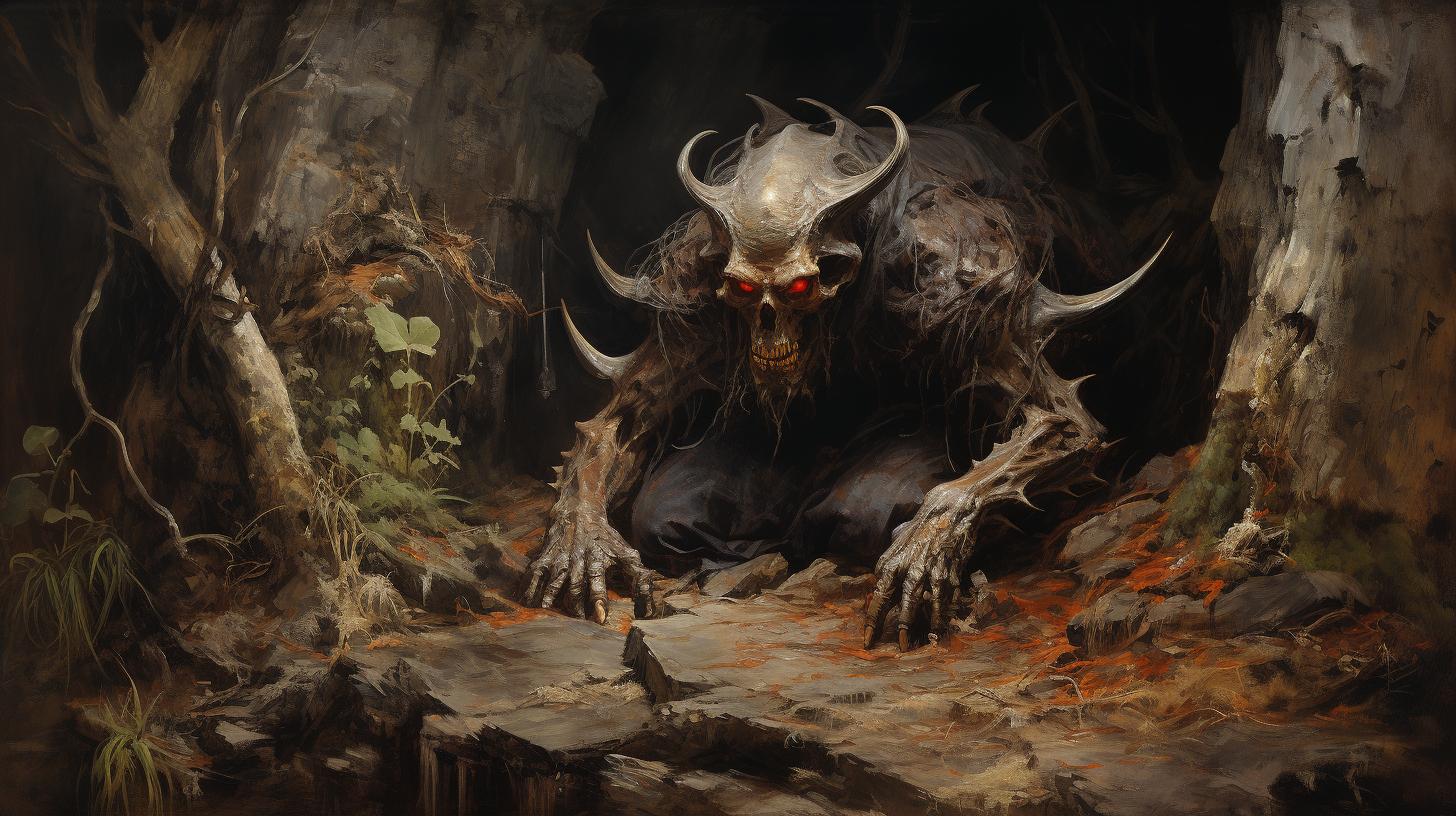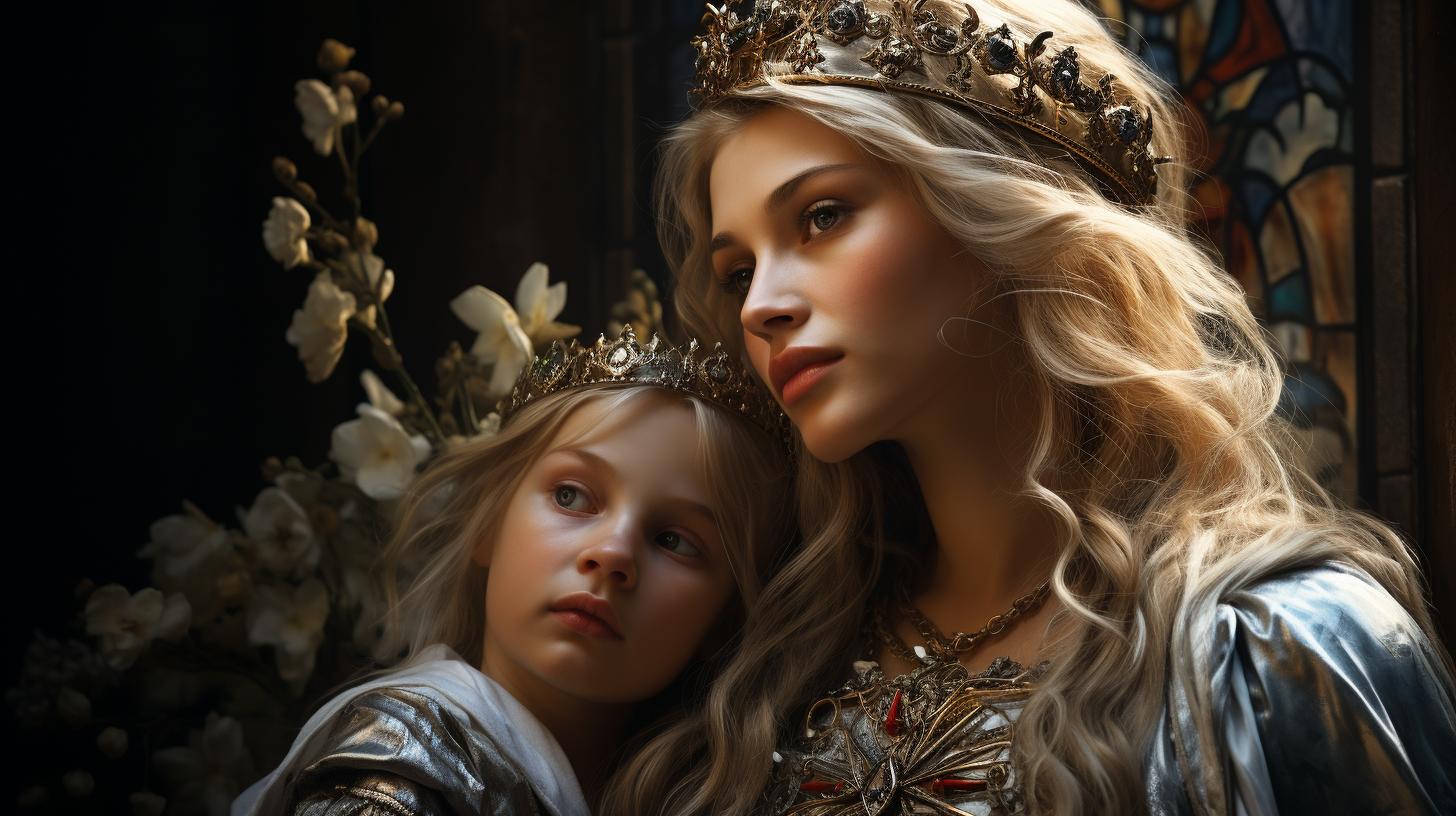Akka: The Powerful Finnish Goddess Embracing Fertility and Femininity

Akka Finnish goddess holds a significant role in Finnish mythology as a symbol of fertility, strength, and femininity. Known by various names like Maa-Emoinen and Rauni, Akka also has connections to thunder, possibly linked to her divine partnership with Ukko. Another intriguing aspect is Akka’s association with the sacred serbal tree, believed to provide protection against lightning.
With a daughter named Manua and spiritual offspring called mantus, Akka’s influence is celebrated during the Day of Snakes, coinciding with the spring equinox. Akka’s magic and close connection with Saami goddess Maderakka further enhance her divine attributes.
Throughout Finnish culture, Akka’s significance remains profound, influencing arts and literature.
Akka Finnish Goddess: Exploring the Mythology and Importance
Akka Finnish Goddess holds a significant place in Finnish mythology, embodying various aspects of divinity. Let’s delve into her fascinating origins and the names by which she is known. Referred to as Maa-Emoinen, Maan-Emo, Rauni, Ravdna, and Roonikka, these names represent the diverse facets of her divine persona.
Each name contributes to the complexity of Akka’s character and adds depth to her mythology.
The Origins and Names of Akka: Maa-Emoinen, Maan-Emo, Rauni, Ravdna, and Roonikka
- Maa-Emoinen: This name emphasizes Akka’s connection to the Earth, symbolizing her role as a nurturing and guiding force.
- Maan-Emo: Highlighting her essence as the Mother of the Earth, this name signifies Akka’s fertility and life-giving qualities.
- Rauni: This name carries an air of mystery, suggesting Akka’s ancient roots and enigmatic nature.
- Ravdna: The embodiment of strength and power, this name underscores Akka’s role as a formidable force within Finnish mythology.
- Roonikka: This name evokes the feminine energy and essence that Akka embodies, emphasizing her relevance to the female experience.
1.2.
The Role of Akka: Fertility, Strength, and Femininity
Akka’s significance lies in her embodiment of fertility, strength, and femininity. As the wife of Ukko, another Finnish deity, Akka forms a divine power couple whose influence permeates Finnish society.
Her divine presence symbolizes the life-giving force of femininity, showcasing the deep-rooted respect for women and their essential role in Finnish culture. Through her associations with fertility, Akka reflects the importance placed on the perpetuation of life in Finnish folklore and mythology.
The Relationship Between Akka and Ukko: Divine Power Couple?
In the rich tapestry of Finnish mythology, the relationship between Akka and Ukko holds a significant place. As a divine power couple, their connection is multifaceted and mysterious, encompassing elements of thunder, fertility, and love.
Let us explore the intriguing facets of their union and the enigmatic meanings it carries.
Akka as a Goddess of Thunder: The Thunderous Connection
Akka’s association with thunder lends an electrifying dimension to her character. Some theories propose that the clashes or passions between Akka and Ukko generate thunder, suggesting a deep connection between their divine forces.
This interpretation infuses Akka with an awe-inspiring power, symbolizing the ferocity and unpredictability of nature’s might.
Ambiguities and Interpretations: Unraveling the Meaning of their Relationship
The precise significance of Akka and Ukko’s relationship remains a subject of debate and speculation. Their bond embodies elements of love, partnership, and cosmic harmony. While they are acknowledged as spouses, the exact nature of their union and its symbolic implications continue to puzzle scholars.
Unraveling these layers of meaning contributes to a better understanding of Finnish mythology and the intricate dynamics within the divine realm.
Exploring the connection between Akka and Ukko unveils a captivating narrative that encompasses thunder, fertility, love, and divine mysteries.
Their intertwined destinies shape the Finnish mythological landscape and reflect the inherent complexities of the natural world.
Akka’s Sacred Connection to the Serbal Tree
Within Finnish mythology, the goddess Akka holds a special bond with the serbal tree, considering them sacred symbols of her power and guardianship. This connection reveals her role as the haltija, or spirit guardian, of serbals, and the symbolism they hold within the culture.
Akka as the Haltija of Serbals: Guardianship and Symbolism
Akka is revered as the spiritual guardian of serbals, bestowing her protective energy upon these trees. In Finnish folklore, serbals were often planted in yards to safeguard buildings against the destructive forces of thunder and lightning.
This belief highlights the perceived connection between Akka’s power and the ability of serbals to ward off these natural phenomena.
Serbals, with their durable and resilient nature, are seen as representations of Akka’s strength and fertility.
They embody the goddess’s nurturing aspects, serving as a physical reminder of her presence in the natural world and her ability to bestow blessings upon crops, homes, and individuals.
The Protective Role of Serbals: Warding off Thunder and Lightning
One crucial aspect of Akka’s connection to serbals lies in their ability to protect against thunder and lightning.
Due to the belief in Akka’s association with thunderous phenomena, the presence of serbals was thought to shield buildings and their inhabitants from the destructive forces of thunderbolts.
By planting serbals near homes or sacred spaces, one sought to invoke Akka’s protective influence.
This act emphasized the significance of the goddess’s role in safeguarding communities and the interconnectedness between nature, spirituality, and human existence.
The symbolic influence of serbals and Akka’s association with them showcases the profound connection between Finnish culture, mythological beliefs, and the reverence given to the goddess and her divine powers.
Akka’s Children and Celebrations
Manua: The Daughter Personifying Dry Land
In Finnish mythology, Akka was believed to have a daughter named Manua who symbolized the dry land. Manua represented the barren and arid aspects of nature, contrasting with Akka’s association with fertility and abundance.
As the personification of the earth, Manua played an essential role in the agricultural cycle, depicting the importance of cultivating and nurturing the land for sustenance.
Mantus: Earth Spirits and Offspring of Akka
Akka was also known to have sons called Mantus, who were believed to be earth spirits.
These spirits were closely connected to the land and its natural forces, acting as guardians and representatives of Akka’s power. As offspring of the Finnish goddess, the Mantus played a crucial role in maintaining the harmony and balance of the natural world.
The Day of Snakes: Honoring Akka in the Spring Equinox
The celebration of Akka’s divine presence coincided with the Day of Snakes, which took place during the spring equinox. On this day, Finnish traditions believed that Akka awakened after the long winter, and serpents and worms emerged from the earth to perform a dance in her honor.
This celebration marked the arrival of spring, symbolizing renewal, rebirth, and the return of fertility to the land.
Experience the enchanting festivities of the Day of Snakes as the Finnish people pay tribute to Akka with joy and reverence, welcoming the bountiful season.
Akka’s Magic and Divine Attributes
In the realm of Finnish mythology, Akka, the revered Finnish goddess, possesses remarkable magical and divine attributes. Let us delve into the profound significance of her powers and the connections she holds.
Channeling Akka’s Power: Harvest and Abundance
Akka is invoked as the goddess of the harvest, bestowing her blessings upon the agricultural endeavors of the Finnish people. Through rituals and invocations, farmers seek her assistance in ensuring a fruitful harvest and abundant yields.
Her divine presence brings forth not just sustenance but also prosperity and prosperity to the land. The reverence for Akka’s power is evident in the celebrations and rituals conducted during the harvest season, where she is honored as the provider of abundance.
- Ancestral rituals passed down through generations pay tribute to Akka’s role in nurturing the lands and sustaining life.
- Ceremonial offerings are made to please her and seek her benevolent influence for a bountiful harvest.
- Communities come together to express their gratitude for the gifts of the earth and the divine intervention of Akka.
Akka and Saami Goddess Maderakka: Motherly Connection
Akka shares a profound and close connection with the Saami goddess named Maderakka.
The bond between them epitomizes the nurturing and motherly aspects of their divine essence.
Maderakka is considered the Saami equivalent of a mother goddess, embodying the care and protection of the land and its people.
Together, Akka and Maderakka symbolize the interwoven forces of fertility, growth, and maternal love.
- Their collective influence is sought to provide solace, healing, and guidance to those who revere them.
- Their interconnected energy fosters stability, balance, and the preservation of nature’s intricate ecosystems.
- Their essence permeates traditional rituals, where devotees pay homage to their benevolence and seek their guidance and protection.
Akka’s magic and divine attributes extend beyond the realm of mere myth.
They intertwine with the daily lives of the Finnish people, nurturing their connection to the land and emphasizing the importance of abundance, growth, and maternal love.
Akka Finnish Goddess in Finnish Culture and Folklore
Akka Finnish Goddess holds profound reverence in the mythology, traditions, and folklore of Finland.
Her significance and worship are deeply ingrained in the spiritual fabric of the Finnish people. Let’s explore the various aspects that illustrate Akka’s enduring presence in Finnish culture and how she has influenced not only religious practices but also arts, literature, and beyond.
Akka’s Reverence in Finnish Mythology: Significance and Worship
In Finnish mythology, Akka is revered as the goddess of Earth, fertility, and feminine power. Her role as Maa-Emoinen, Maan-Emo, Rauni, Ravdna, and Roonikka highlights her multifaceted nature and importance in Finnish folklore.
Akka’s worship and rituals are conducted to seek her blessings for abundance, harvest, and prosperity.
Akka’s sacred significance is reflected in various mythological tales and folklore, where she is invoked as a guardian deity for the land and its people.
Her presence is deeply intertwined with the Finnish identity and is honored through heartfelt prayers, offerings, and ceremonies.
Exploring Akka’s Influence in Arts, Literature, and beyond
Akka Finnish Goddess has fueled artistic expression and inspired numerous works in Finnish arts and literature. Her mythological persona, representing fertility and femininity, has found its way into paintings, sculptures, and other visual arts, capturing the essence of Finnish cultural heritage.
In literature, Akka’s tales have been immortalized in poems, folk songs, and epic sagas. From ancient folklore collections to contemporary literary works, her presence permeates through Finnish narratives, delving into her powers and the deep connection she holds with the land and its people.
Akka’s influence extends beyond traditional art forms and literature. She has become a symbol of empowerment and a source of inspiration for modern Finnish society. Her divine attributes of strength and fertility continue to resonate with individuals, transcending cultural boundaries and fostering a sense of identity and pride.
In summary, Akka Finnish Goddess occupies a central place in Finnish culture and folklore. Her worship and reverence have persevered through generations, while her influence can be seen in various artistic expressions and literary works.
This enduring presence speaks to the enduring significance of Akka within the cultural tapestry of Finland.
.




















